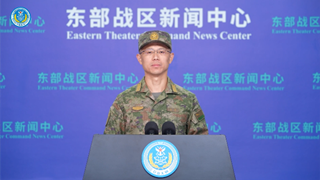By Wang Jin
On May 7, the League of Arab States (LAS) agreed to reinstate Syria's membership in the league at a special session of foreign ministers held in Cairo, the capital of Egypt. Syria's return to the LAS marks another milestone in the Middle East reconciliation process after Saudi Arabia and Iran reached the agreement to resume diplomatic relations in Beijing. It is conducive to the unity and self-renewal of Arab countries, the development and rejuvenation of the Arab world as well as peace and stability in the Middle East.
After the outbreak of the Syrian crisis in 2011, the LAS suspended Syria's membership, and many Arab countries closed their embassies in Syria. As the situation in Syria has become increasingly stable since 2018, more and more countries in the Middle East have started to engage with Syria. Many Arab countries called to restore Syria's status in the LAS and reopen their embassies in Syria and ports bordering it. The decision to reinstate Syria's membership was made against the will of the United States, which signifies that the legitimacy of Syria in the Arab world has been restored and reflects that the diplomatic independence of Arab countries has been elevated to a higher level.
First, the resumption of Syria's membership shows increased unity within the LAS. As one of the founding member states of the league, Syria has always enjoyed high prestige and influence in the organization. Arab countries were divided over the response to the Syrian crisis when it broke out. Some countries like Qatar proposed to isolate Syria diplomatically and politically and provide support to Syrian opposition forces. Other countries like UAE wished to resolve the crisis through dialogue. The divergence on the Syrian issue reflects differences in political philosophy and diplomatic thinking among the LAS member states. However, amid the abating situation in the Middle East in recent years, especially after China successfully mediated the restoration of diplomatic relations between Saudi Arabia and Iran in March 2023, a new opportunity for peace within Arab countries has appeared. The unanimous endorsement of Syria's membership reveals that Arab countries have gradually bridged the divide on the Syrian issue with strengthened unity and cohesion.
Second, relations between Syria and Arab countries will be presented with new development opportunities. Since 2019, Bahrain, Oman, the UAE and Sudan have reopened their embassies in Damascus in succession. And countries including Jordan, Egypt, Morocco, the UAE and Oman have held talks with senior officials of Syria in a row. The return of Syria to the league indicates that its traditional opponents have been inclined to carry on pragmatic dialogues with it, which will accelerate normalized relations and reinvigorate bilateral communications between Syria and other Arab countries.
Third, Syria will embrace new opportunities for economic and social reconstruction. Syria is confronted with heavy difficulties in this respect due to more than 10 years of conflicts and wars, and demands urgent support and assistance from regional countries and the international community. The resumption of Syria's membership proves its security and political situations have won unanimous recognition from Arab countries. A positive political and security environment in Syria will boost these countries' confidence of increasing investment to promote its industrial reconstruction. In the future, some enterprises and organizations in these countries may further step-up financial assistance to Syria to help it rebuild infrastructure and restore energy and medical care industries. The improvement of the external environment will bring more cooperation opportunities to empower its economic and social development, help relieve the capital and labor shortage challenges during its national economic reconstruction, and facilitate rejuvenation of the service and foreign trade sectors of this country.
Finally, the US has a fading influence on the Syria issue, which has long been high on the agenda of the hegemon's Middle East policy. On the one hand, the US has given persistent support to the Syrian opposition forces and interfered with the domestic political reconstruction process of Syria. On the other hand, the US has long deployed military forces in northern and southern Syria and blatantly stole the oil resources of this land. Besides, the US had also imposed many sanctions upon Syria to impede its economic and social reestablishment. In February 2023, the unilateral sanctions of the US blocked the golden 72-hour window for aid in Syria when a strong earthquake struck southern Turkey regions adjacent to Syria, making the disastrous situation even worse. This also made the countries in the Middle East realize that for the common good of Arab countries, the Syrian issue can no longer be thrust aside. The US diplomatic policy of isolating and suppressing Syria has been encountering censure and objection from more and more Arab countries.
(The author is an associate professor of the Institute of Middle Eastern Studies of Northwest University)









